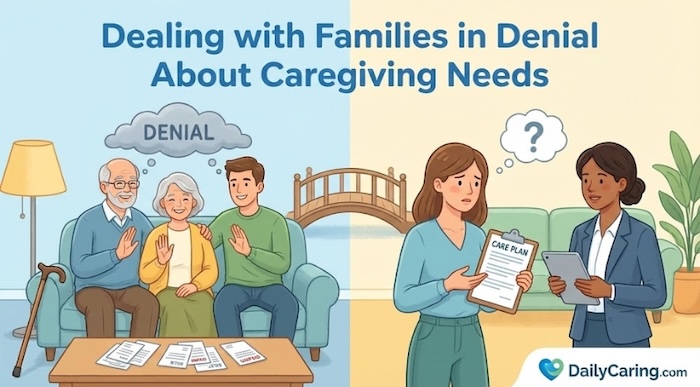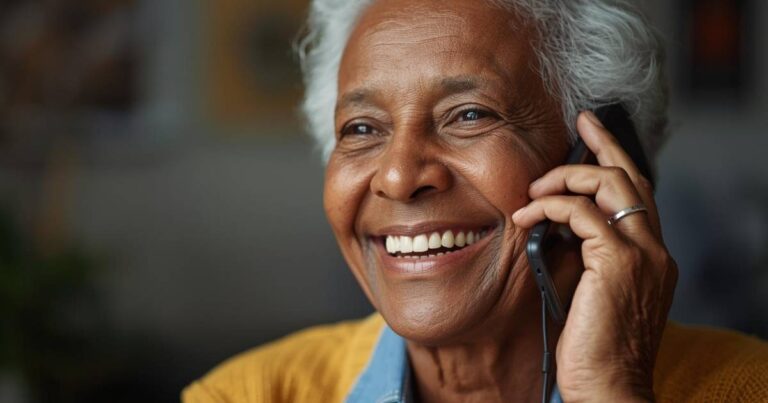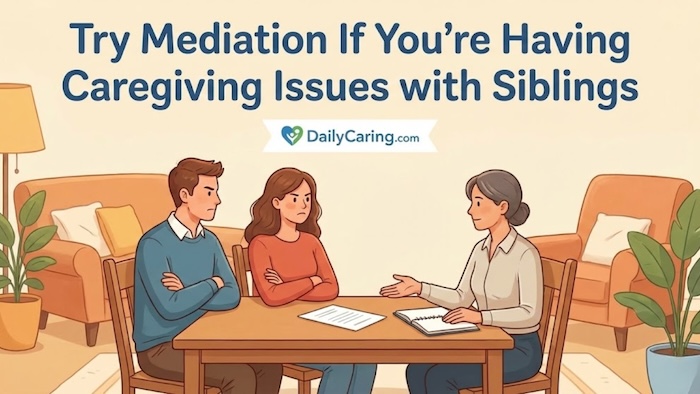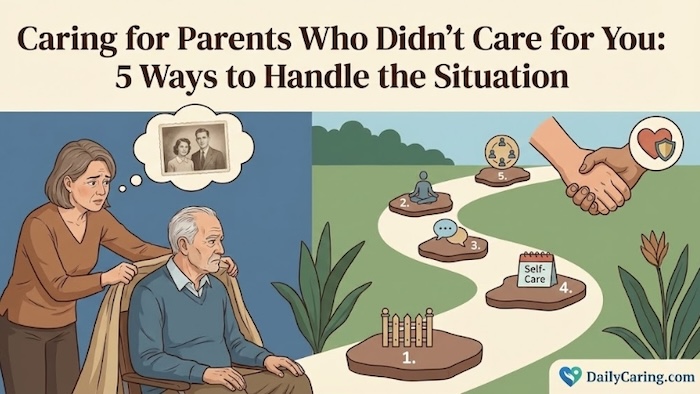Watching an older family member's health decline is difficult, but facing that reality becomes even more painful when other loved ones refuse to acknowledge the need for help. This denial can leave you feeling isolated, frustrated, and unsure how to proceed with crucial care decisions.
The article about family members in denial offers clear guidance on navigating this challenging dynamic, helping you move forward with compassion and purpose to ensure your loved one receives the support they need.

When the Family Doesn’t Believe Your Loved One Needs Help
You might be frustrated by family members who are in denial about your older adult’s declining health and increasing care needs.
Whether it’s about Alzheimer’s, dementia, fall risk, stroke recovery, or another health condition, their denial can make you feel angry, stressed, and frustrated.
We explain why someone might be in denial and share three techniques to help you convince family members that your older adult has a serious health condition and needs caregiving help.
Even if you can’t break through someone’s denial, you can at least move on and make decisions without their input, knowing that you did your best to help them understand.
Why Would Someone Be In Denial About Care Needs?
According to Verywell Mind, denial is a defense mechanism, a strategy “that people use to cope with distressing feelings.”
Asking someone to change how they see your older adult threatens their whole world. That’s often why people resort to denial.
It’s safe and comfortable to pretend that everything is fine and nothing is changing.
For some, denial is a subconscious way to ignore the fact that their parent or spouse is declining. For others, it’s a way to avoid taking on caregiving responsibilities.
3 Strategies on How to Deal With Family Members in Denial About Caregiving Needs
Stay calm and be the bigger person
Families in denial about seniors needing help are incredibly frustrating. Even if you really don’t want to bite your tongue, it helps to stay calm and be the bigger person.
Do your best to be kind and understanding when speaking with someone in denial.
Showing anger or being sarcastic will only make them dig their heels in deeper or feel justified in resisting your reasoning.
Share educational information
Sometimes denial comes from not fully understanding the situation.
Share educational information that explains your older adult’s condition, typical symptoms, and the type of care they’ll most likely need.
For example, your brother may have no idea how Alzheimer’s or dementia affects people besides the stereotypical memory loss or confusion.
So, he takes mom’s side when she insists that she’s still perfectly capable of driving her car.
Rather than arguing, show him the doctor’s report stating that Mom should no longer drive because of her advancing Alzheimer’s.
And, point him to trusted sources of information about Alzheimer’s and dementia, like Alzheimer’s Association or here on DailyCaring.
Meet with an expert like a geriatric care manager
Some family members may not believe you, but might listen to an impartial expert.
Offer to go together to talk with the doctor about your older adult’s health and care needs.
Alternatively, ask an impartial person, such as a geriatric care manager, elder mediator, or spiritual leader, to attend a family meeting and facilitate an open discussion.
Final Thoughts About Family Members in Denial
While breaking through a family member's denial can be an uphill battle, staying calm, sharing expert information, and seeking a neutral third-party perspective can provide a constructive path forward. Even if you cannot immediately change their perspective, you can find peace in knowing you have done your best to communicate with empathy and clarity.
Ultimately, these techniques empower you to make informed, necessary care decisions for your loved one's well-being, even without complete family consensus, allowing you to move forward with confidence.
Recommended for you:
- Caregiving with Siblings: 5 Tips for Working Together
- 6 Ways to Improve the Situation When Siblings Don’t Help with Aging Parents
- Overcome 3 Excuses from Relatives Who Avoid Caregiving
About the Author

Connie is the founder of DailyCaring.com and was a hands-on caregiver for her grandmother for 20 years. (Grandma made it to 101 years old!) She knows how challenging, overwhelming, and all-consuming caring for an older adult can be. She also understands the importance of support, especially in the form of practical solutions, valuable resources, and self-care tips.














My sibling in Baldwin, NY was in denial to such great lengths about our mother having clinically diagnosed dementia, he did not care to help our mom until his girlfriend that was visiting the US on a Visa seen our mom dementia for herself, convinced him to arrest me when I had arguement with him, he married this same girl in court to keep her in the country on a pregnancy claim in one vacation week … to get me out of the way to control the liquidity rental income of our mom’s multi-family homes, than to believe his sister telling him our mother has dementia. He has since used our mother’s social security number to refinance his car loan and registered mom’s name for the vehicle, to name a few of his crimes.
We’re so sorry to hear about your sibling’s terrible behavior 🙁
Yes, Karen, I am in a very similar situation. Makes caring for Dad very difficult. Not sure how best to handle it.
I have 2 brothers and both pretend that dad is fine. I’m the only one that helps mom care for him. He doesn’t bother me cause I know he can’t help that he doesn’t remember how to do things anymore. It’s my mom that will drive you crazy! Being around her is so depressing. She’s either complaining or fussing about something.I need help dealing with HER not him, does anyone else have this problem?
If the family’s in denial, how do you have a caregiver?
Great question! The article is directed at the family caregiver who is trying to convince other people in the family that the older adult needs more help. Often, there’s a primary caregiver who sees the decline, usually because they see the older adult frequently. Other family members who aren’t close to the situation are more likely to be in denial that the decline is happening. That can cause disagreements about hiring in-home caregiving help or considering assisted living.
We finally solved the problem of denial by having both parents stay for a two week visit at the “deniers” homes. That visit finally brought the issue to light.
That’s a very effective way to show someone in denial exactly what the real situation is! Thank you for sharing.
I’ve actually written something similar to this article as well. There are definitely other signs that you should check out as well. For example, if you notice and emptier than usual fridge or lots of spoiled food, it might be a sign that your loved one isn’t eating properly because they’re unable to go outside. This can also lead to a decline in physical health and your loved one might look more frail.
I definitely agree with you that as a caregiver for your loved one, educating yourself is one of the best things to do! There are tons of great resources out there and many of them are free.